Watchlist July 2024
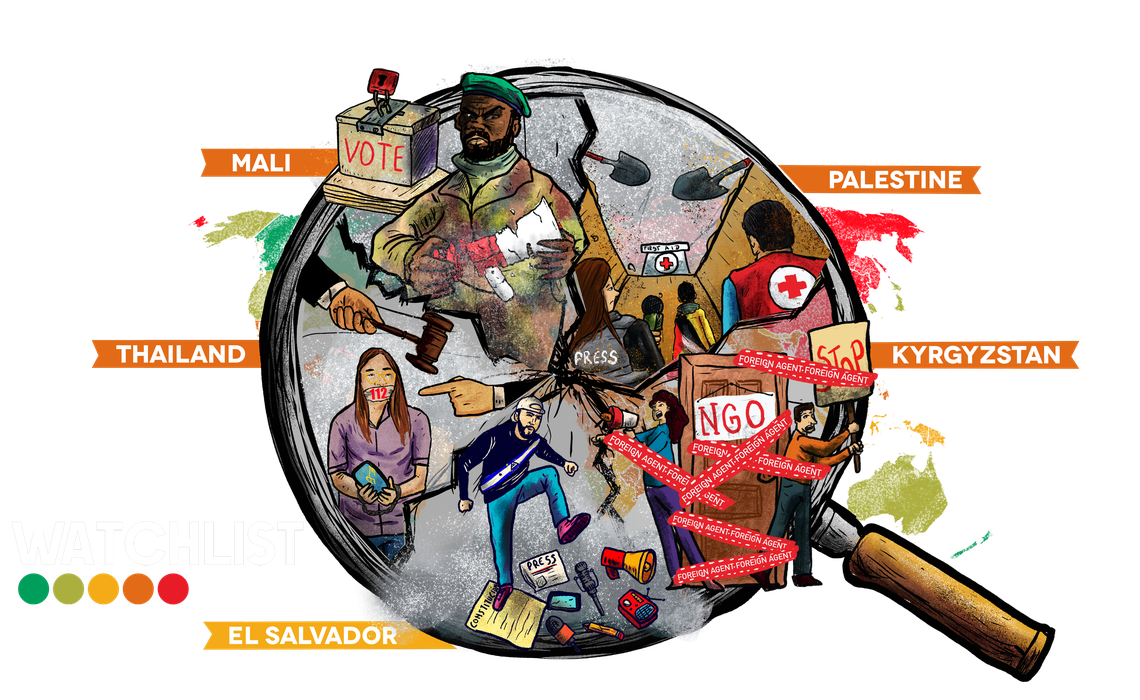
July Watchlist 2024
Latest Update: 10 July 2024 - The new CIVICUS Monitor Watchlist highlights serious concerns regarding the exercise of civic freedoms in El Salvador Kyrgyzstan, Mali, Palestine, and Thailand
The Watchlist draws attention to countries where there is a serious decline in respect for civic space, based on an assessment by CIVICUS Monitor research findings, our research partners and consultations with activists on the ground.
In the coming weeks and months, the CIVICUS Monitor will closely track developments in each of these countries as part of efforts to ensure greater pressure is brought to bear on governments. CIVICUS calls upon these governments to do everything in their power to immediately end the ongoing crackdowns and ensure that perpetrators are held to account.
Descriptions of the civic space violations happening in each country are provided below. If you have information to share on civic space in any of these countries, please write to monitor@civicus.org.


Kyrgyzstan remains on our Watchlist following the President’s signing of the contentious “foreign agent” law on 2 April, 2024. Non-governmental organisations that receive funding from abroad and engage in so-called political activities must now register as “foreign representatives” by 16 July. Those who fail to do so risk suspension of their activities or liquidation. Reports indicate that some organisations have already shut down their operations due to fears of the law's potential consequences.
Following a protracted process, over 20 journalists, activists, human rights defenders, and opposition figures arrested in the so-called “Kempir-Abad case” in 2022 were acquitted on 14 June 2024. However, the prosecution has appealed this ruling and authorities continue to detain critics on trumped-up charges, threatening them with heavy prison sentences.
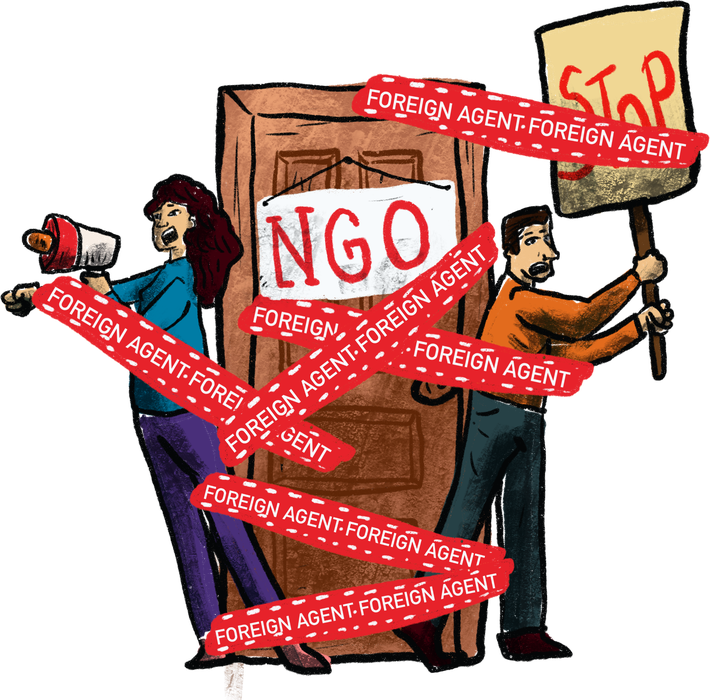
Eleven journalists from the investigative group Temirov Live, arrested in January 2024 on charges of calling for “disobedience” and riots related to their reporting, went on trial in June. If convicted, they could face up to eight years in prison. At the start of the trial, four remained in pre-trial detention, including Makhabat Tajibek kyzy, the director of Temirov Live and wife of the group’s chief editor, Bolot Temirov, who was expelled from the country in 2022. She reported being beaten by a prison officer in April, with representatives of the Ombudsperson’s office confirming she had suffered bruises to her face, hands and body. However, the prosecutor’s office later announced the closure of the investigation into her allegations, accusing her of staging her own injuries.
The space for free expression continues to shrink. In May 2024, the court decision to shut down the investigative portal Kloop was upheld on appeal. A widely criticised draft media law remains under consideration and other draft legislation would allow the government to issue fines for “slander” and “insults” in media and online without court sanction. Additionally, an increasing number of blogger-activists have faced criminal charges due to their social media posts and civic engagement. For example, writer-activist Olzhobay Shakir was recently sentenced to five years in prison, poet-musician Askat Zhetigen to three years in prison, and human rights activist Ondurush Toktonasyrov fined the equivalent of around 1000 EUR because of social media posts.

There are serious concerns about the state of civic space in Thailand, particularly the targeting of activists, critics and the opposition by the government of Prime Minister Srettha Thavisin.
The government has continued to use royal defamation (lèse-majesté) provisions or Article 112 to arrest and convict activists, critics and politicians for insulting the monarchy. Courts routinely deny bail to individuals charged or impose strict conditions in cases where bail is granted. According to Thai Lawyers for Human Rights (TLHR), since early 2020, more than 270 people have been charged with violating the law and at least 17 are being held in pre-trial detention.
Recent cases include the prominent human rights lawyer and democracy activist Arnon Nampa who was sentenced to a further two years imprisonment in April 2024, while in May 2024, opposition lawmaker Chonthicha Jangrew of the Move Forward Party was also sentenced to two years in jail. Activist Netiporn ‘Bung’ Sanesangkhom, who had been detained since January 2024, died in custody in May 2024, after suffering a cardiac arrest. No one has been held accountable for her death.
There are also concerns about transnational repression in Thailand. In May 2024, Human Rights Watch reported an upsurge in repression directed at foreign nationals seeking refugee protection in Thailand. Foreign governments have subjected exiled dissidents and activists to harassment, surveillance and physical violence, often with the cooperation and knowledge of Thai authorities. Vietnamese activist Y Quynh Bdap was detained in Thailand on 11 June 2024 and is at risk of deportation, where he could be subjected to severe persecution.
The opposition Move Forward Party – that won the highest number of seats in parliamentary elections in 2023 - is at risk of being dissolved by the Constitutional Court for their pledge to amend the royal defamation provisions.
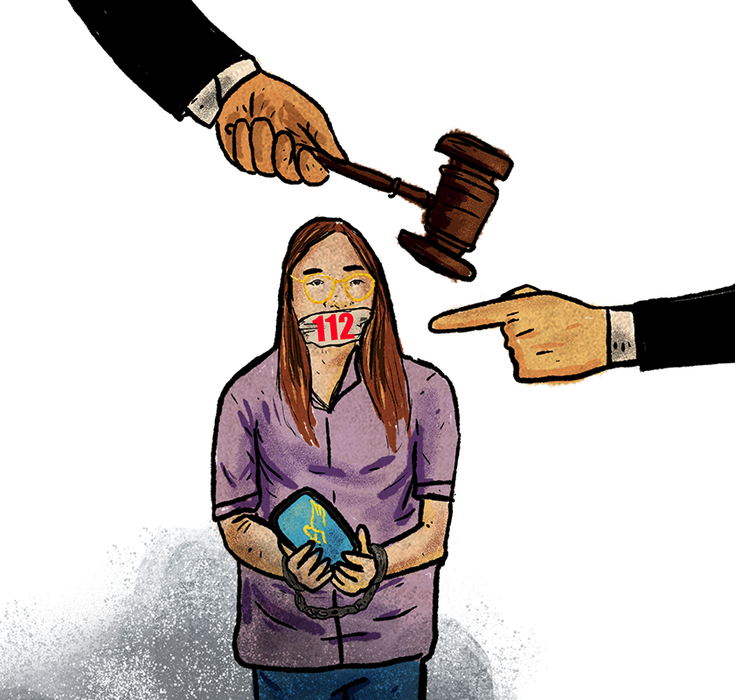

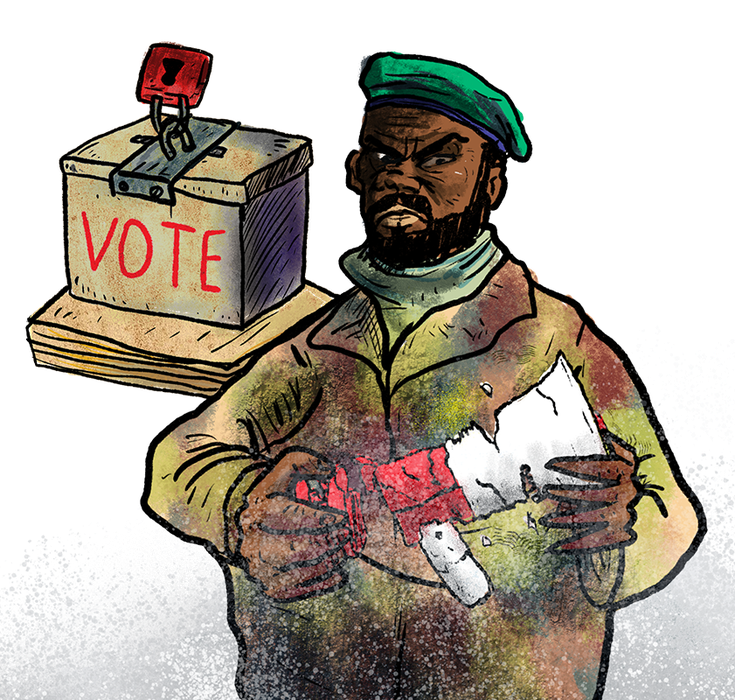
Since Mali’s military coups in August 2020 and May 2021, civic space in Mali has been deteriorating. The past few months saw increasing censorship and a crackdown on critics, in particular those calling for an end to military rule and a return to constitutional order. In September 2023, elections, originally foreseen for February 2024, were postponed indefinitely with the military junta citing ‘technical reasons’ for the delay.
On 10 April 2024, the Council of Ministers adopted decree 0230/PT-RM, suspending the activities of political parties and activities ‘of a political nature’ of associations ‘until further notice’ using grounds of preserving public order. The measure follows a call on 31 March 2024, by more than 80 Malian political parties and associations, demanding a return to constitutional order and the organisation of presidential elections. The following day, Mali’s media regulator, the High Authority for Communication (HAC) invited all media to stop broadcasting and publishing the activities of political parties and associations.
Since December 2023, military authorities have dissolved at least five associations and political movements, often seemingly in response to their criticism or calls for the return to civilian rule. This includes Coordination of the Appeal of 20 February 2023 to Save Mali in April 2024, Association of Pupils and Students of Mali and Coordination of Movements, Associations and Supporters of Imam Mahmoud Dicko in March 2024, the association Kaoural Renouveau in February 2024 and the CSO Elections and Good Governance Observatory in December 2023.
Meanwhile, activists, journalists and political figures have been arbitrarily detained and prosecuted, in particular for criticising the state of affairs or the military junta. For example, on 20 May 2024, economist, activist and university professor Etienne Fakaba Sissoko was sentenced to two years in prison, of which one year suspended, and a fine for ‘defamation’, ‘damaging the state’s reputation’ and ‘distribution of fake news in relation to the publication of his book ‘Propaganda, Agitation and Harassment – Government Communication during the Transition’. In June 2024, ten political opposition figures – members of the 31 March Declaration Opposition Platform which calls for a return to the constitutional order – were arrested and face charges of ‘conspiracy against the government’ and ‘undermining public order’, among other offences.
Furthermore, Mali’s national media regulator, HAC, regularly suspends media outlets, often for reporting on or commenting on the security situation in Mali. In February 2024, HAC suspended France 2, French public TV channel, on accusations of ‘glorifying terrorism’ by ‘contrasting the firepower of armed terrorist groups’ with that of the Malian army in a report by France 2 of the security situation in Mali.

Civic space conditions have steadily worsened under the state of emergency in El Salvador. Since his first term in 2019, President Nayib Bukele has spearheaded a ruthless crackdown on organised crime groups. He has also taken drastic steps to target his critics and consolidate power by adopting measures that restrict citizens’ fundamental freedoms. As a result, El Salvador was previously added to the CIVICUS Monitor Watchlist in March 2022.
Following his re-election in February 2024 and his swearing-in four months later, serious concerns exist about a significant decline in respect for civic freedoms. There is an increasingly hostile environment when it comes to exercising freedom of expression and association, with documented cases against journalists and human rights defenders (HRDs).

Public vilification, intimidation, smear campaigns and denial of access to information continue to be tactics frequently deployed against journalists. There is a restrictive and hostile environment for the press, exemplified by the 319 violations of press freedom, mainly committed by public officials, as recorded by the Association of Journalists of El Salvador (APES) during the general elections on 4 February 2024 and the municipal elections on 3 March 2024.
According to the human rights organisation Cristosal, for the past four years, the environment for HRDs has been the most challenging since the signing of the Peace Accords in 1992. HRDs have been facing surveillance, harassment and other forms of violence, including cases of enforced disappearance and arbitrary detention of women HRDs reported by the Mesoamerican Initiative of Women Human Rights Defenders in 2024. Moreover, there has been a surge in stigmatising rhetoric from top government officials against HRDs.
Women journalists have been facing a range of digital and physical threats and intimidation. In early February 2024, the Alliance of Feminist Media Outlets denounced sexist online threats that reference physical features, and are aimed at intimidating or shaming the journalists.
Restrictive legal reforms have also taken place, which could further hinder civic freedoms. A draft “foreign agent” law could be used to stifle CSOs’ work. The proposed legislation would impose a 40 per cent tax on some international funding and would limit legitimate activities of CSOs receiving funding or support from abroad. It would also require them to register as a ‘foreign agent’ with the Interior Ministry. It has been partially approved and a final approval from the plenary of the Legislative Assembly is pending.
Furthermore, on 27 April 2024, the National Assembly approved an amendment to Article 248 of the Constitution, which allows a single legislature to pass constitutional reforms, rather than two separate legislative assemblies. This reform could limit accountability, transparency and participation in future constitutional processes. In addition, on 7 June 2024, authorities renewed the state of emergency for the 27th time, extending it for an additional 30 days until at least July 2024, prolonging abusive measures that have hindered the ability of HRDs and journalists to work freely and safely.

Palestine is retained on the WL as Israel’s bombardment continues. As of 9 June 2024, over 37,000 Palestinians and 1,139 Israelis have been reported as killed, including at least 105 journalists (100 Palestinian, 2 Israeli and 3 Lebanese). More than 250 aid workers have been killed in Gaza since the 7 October 2023 assault in Israel, after Israeli forces carried out at least eight strikes on aid workers’ convoys and premises in Gaza since October 2023, even though aid groups had provided their coordinates to the Israeli authorities to ensure their protection.
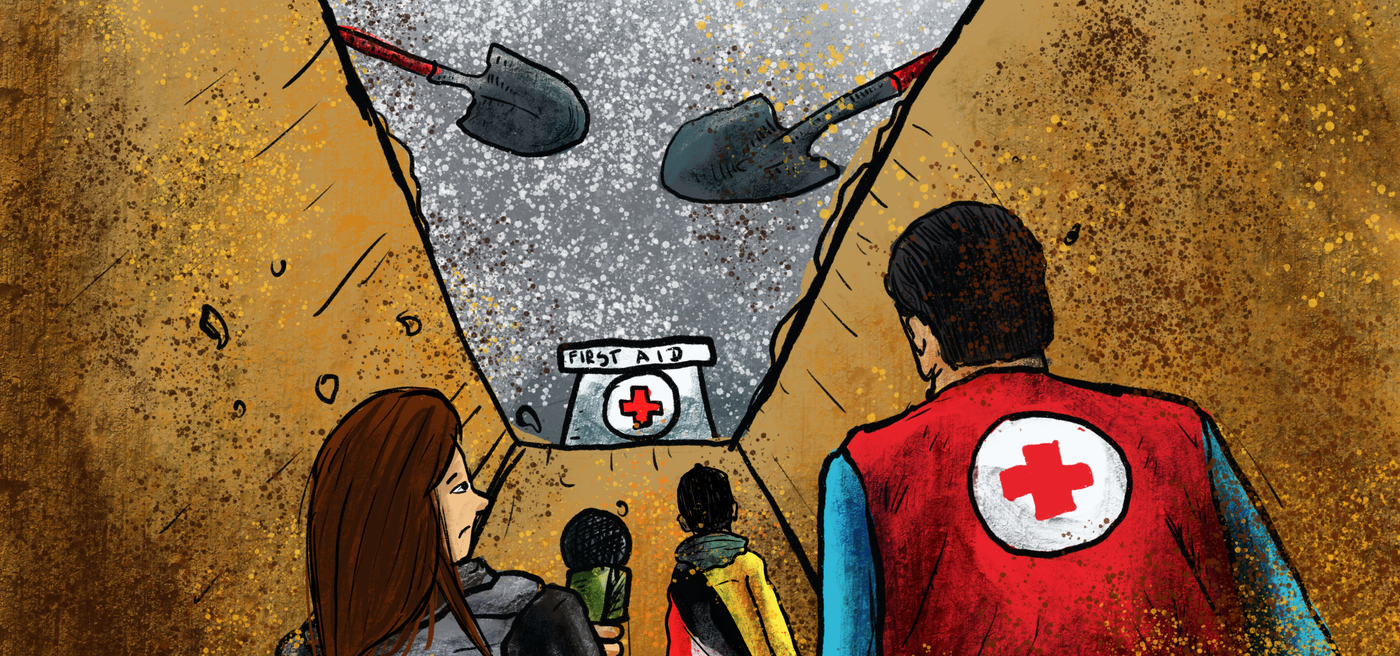
Despite the devastation being faced in Palestine, UNRWA and Palestinian CSOs continue to face a looming threat to their existence due to funding freezes from key donors. While most donors have since reinstated their funding to UNRWA after a wave of suspensions earlier this year, funding from some key donors such as the US and the UK remains frozen. In March 2024, the United States House of Representatives approved a $1.2 trillion funding bill that would ban funding for the UNRWA amid the humanitarian catastrophe in Gaza.
